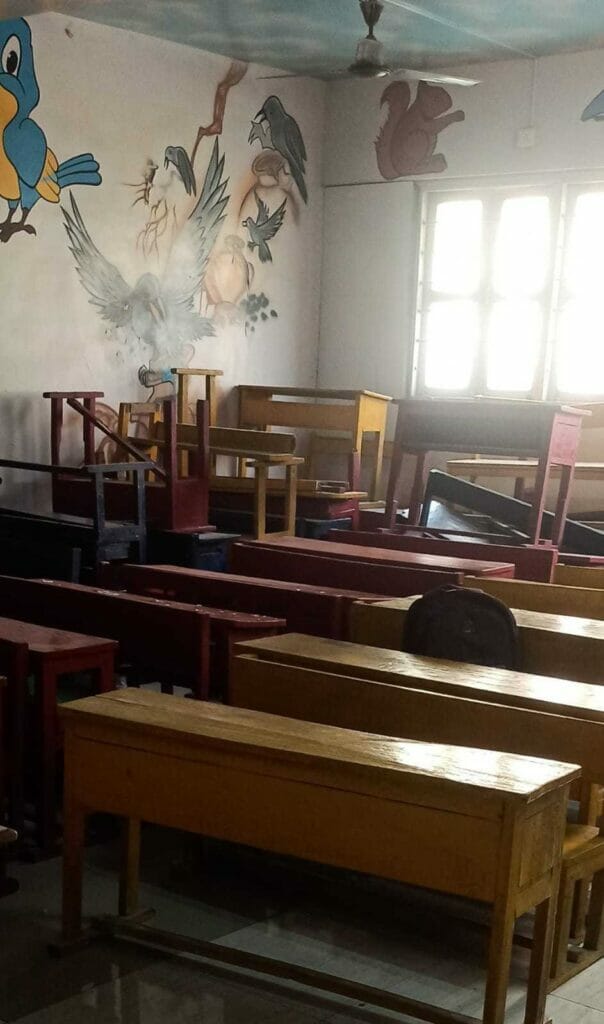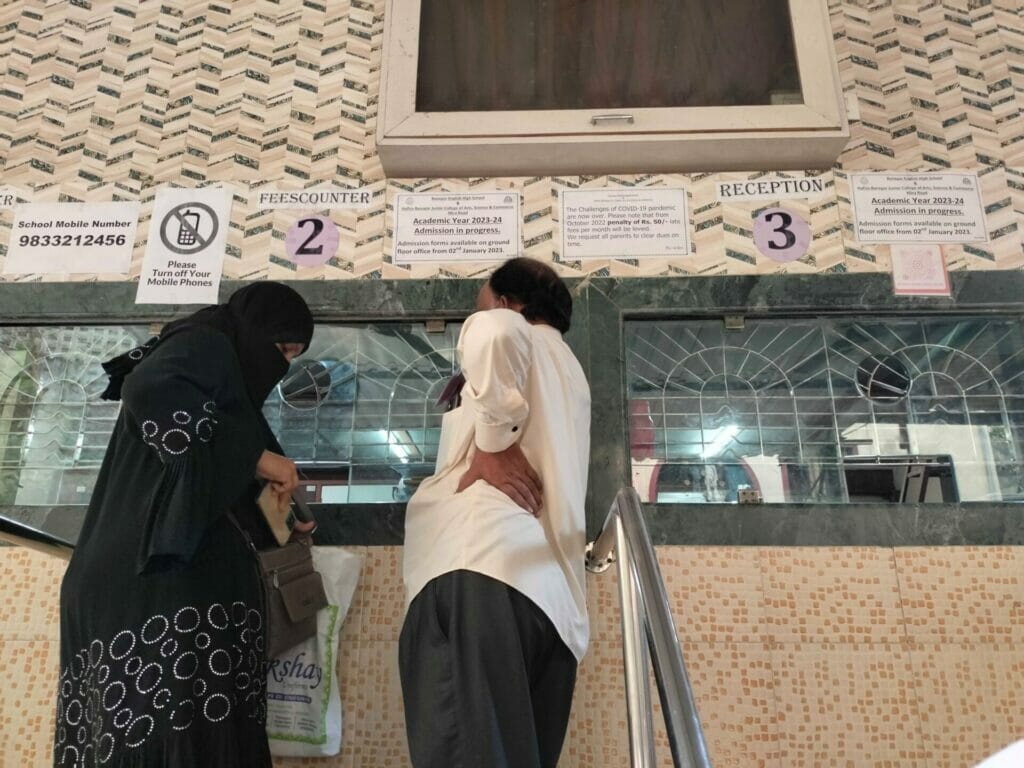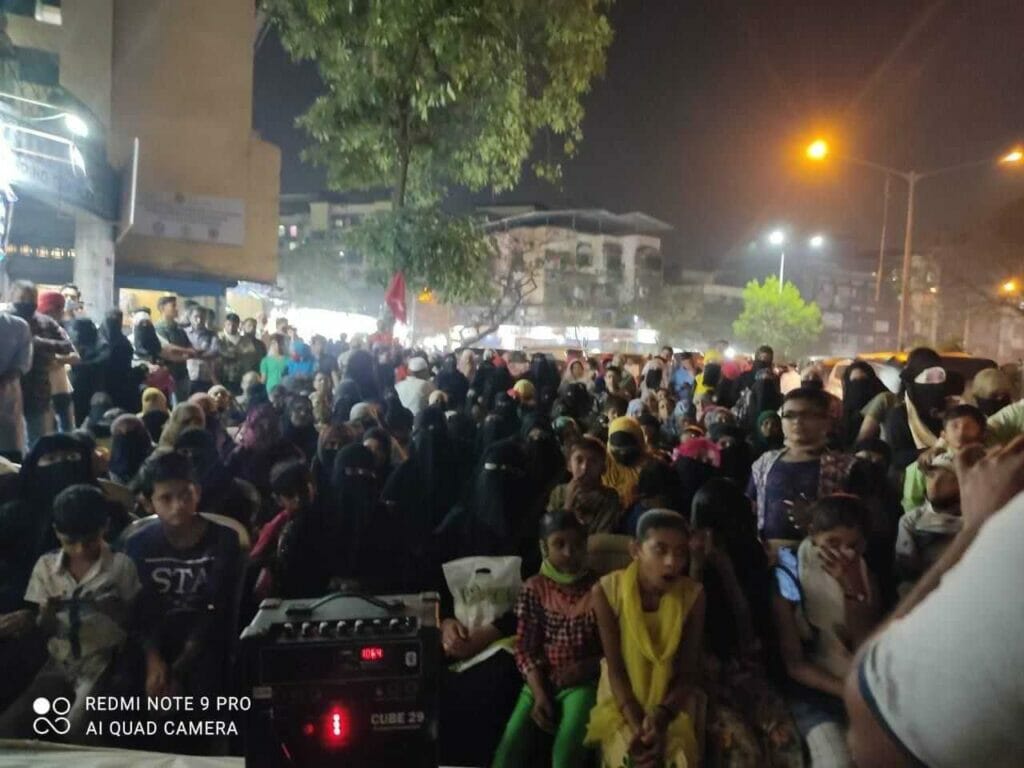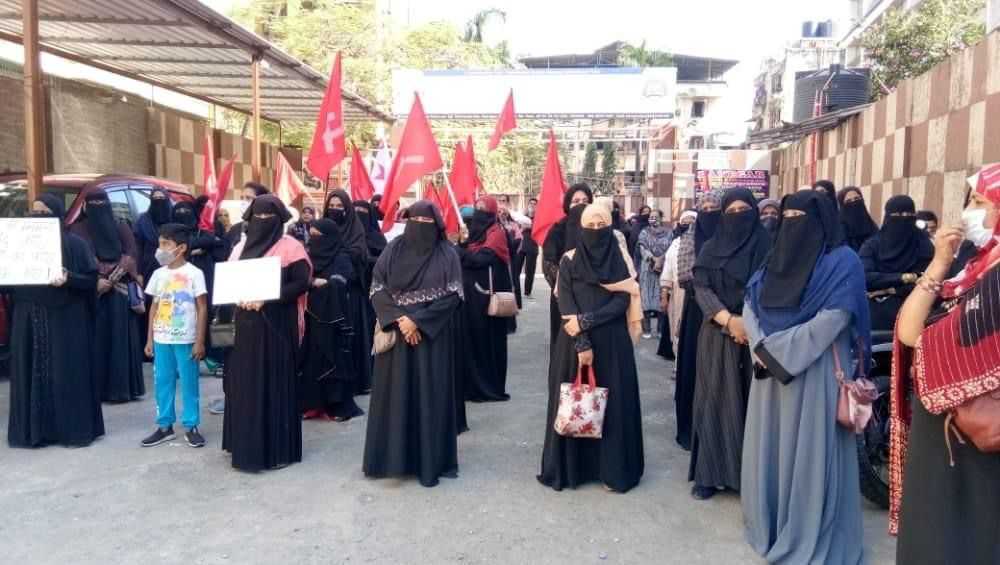On December 15th, 2022, around 15 students at the Banegar English High School in Mira Road were in for a rude shock. Denied permission to attend class as on a normal day, they were made to sit apart in a spare classroom with broken desks and benches. The reason: their parents had been unable to pay their school fees, and this was their punishment.
“They switched off the fan and made them sit in the storeroom for the entire day. No teacher came to check on them, nor were they let out at recess,” says Swaleha, mother to seventh grader Abdul Malik, who was among the students detained. “What’s worse, the other kids mocked them for being poor.”
A similar incident was reported in January, when Sharadashram Vidyamandir International School in Dadar refused to let a second grader write an exam, making her sit in a separate classroom for the duration. Days before, the school had warned the parents of such action in a letter, as they had not paid the school fees.
A third school, Harmony Public School in Navi Mumbai, was implicated this month for the same course of events, when the Maharashtra State Commission for Protection of Child Rights (MSCPCR) issued it a show cause notice. The school had allegedly stopped two siblings from appearing for exams back in 2018-19. The elder child was in the tenth grade and due to appear for the SSC board exams. She was denied entry into the school and worse, denied a school leaving certificate, alleged her father, preventing her study for the next four years.

The aftermath
After Abdul Malik and his fellow students – from between the fifth and tenth grades – were detained on that fateful day at Banegar English High School, things went one of two ways: parents scrambled to pay the fees, or stopped sending their children to school.
Swaleha explains her economic situation: her husband lost his tempo (vehicle) taken on loan and his job as a tempo driver during the pandemic. The fees of her four kids accumulated to over Rs 2 lakh. Not to mention that having just one phone effectively stopped the education of all but the eldest. She started paying back their fees, one by one, when her husband got his job back, now driving for someone else and earning between Rs 15,000 to Rs 30,000 a month.
She prioritised the fees of her elder children, as they were in the pivotal tenth grade and the school. So when Abdul Malik was stopped from attending class, his fees – almost Rs 60,000 – were a long time pending.
“I asked my friends, trusts and charity for help, and collected enough to pay off his fees of one year, after which they have let him in class again,” says Swaleha. “But the fees for the current year are continuing to pile up.” One of the people that helped her with a crowdfunding campaign was her friend Mehmooda, who accompanied her to the school and saw the students sitting in the spare classroom.
Even now, she alleges, the school is threatening to stop Abdul Malik from appearing for the final exam if the remaining fees aren’t paid.
Another parent of sixth and eighth-grade siblings detained, who did not want to be named for fear of repercussions on her children, narrates a similar story. “My daughter fell ill because of the incident, so I stopped sending her to school till I could clear the pending fees with a loan,” she says.
Despite multiple attempts, Banegar English High School did not respond to requests for comment.

Perspective of the law
From conversations with multiple officials in education departments across the state, it is clear that such action on the part of school management authorities is resoundingly against the law. Detaining a child while under the care of a school would fall under mental harassment, and is outlawed by the Right to Education (RTE) Act, 2009. The punishment for such a move falls under the Juvenile Justice (JJ) Act, 2015.
Section 17 of the Right to Education (RTE) Act, 2009:
Prohibition of physical punishment and mental harassment to child.—
(1) No child shall be subjected to physical punishment or mental harassment.
(2) Whoever contravenes the provisions of sub-section (1) shall be liable to disciplinary action under the service rules applicable to such person.
Section 75 of the Juvenile Justice (Care and Protection of Children) Act, 2015:
Punishment for cruelty to juvenile or child.— Whoever, having the actual charge of, or control over, a juvenile or the child, assaults, abandons, exposes or wilfully neglects the juvenile or causes or procures him to be assaulted, abandoned, exposed or neglected in a manner likely to cause such juvenile or the child unnecessary mental or physical suffering shall be punishable with imprisonment for a term which may extend to three years or with fine of one lakh rupees or with both.
“Schools cannot pressure students like this, as it can disturb them psychologically,” said Al-Nasser Zakaria, a former member of the BMC’s Education Committee. “They cannot detain them, block their hall ticket or stop them from appearing for exams.”
Another former member of the committee, Sainath Durge, echoes this. “This is absolutely wrong. I will write to the deputy director of education and ask them to take action against the school.”
But these are avenues Mehmooda and Swaleha have already exhausted. Both claim to have complained to the police, who refused to move on it, claiming this wasn’t a criminal case; their complaint to the Education Department also went unanswered.
However, things can go down differently. After the incident in the school in Dadar, the child’s father and Nitin Dalvi, an education activist and member of the Aam Aadmi Party (AAP), sent a complaint to the child rights commission, deputy director and education secretary. “The next day, an FIR was registered against the school principal and teacher,” says Nitin.
“The contract of fees is between the parent and school. The child should not be affected in any way,” he adds
Read more: Interview with Farida Lambay, Pratham: Dealing with COVID’s toll on education in Mumbai
What can schools do?
On the other side, schools too are saddled with monetary obligations of their own. “Parents should also understand that schools need funds to function: for salaries, overheads, electricity, water, maintenance, etc,” said Al-Nasser.
So what can schools do when faced with the non-payment of fees?
Good practice, recommends Sainath, is to reach a mutual understanding with the parent. Concessions can be made concerning the time window to pay the fees, or payment in instalments allowed.
But should the school want to take another route, Nitin suggests legal recourse. “Just like a bank does, the school can send a notice from a lawyer or file a lawsuit against the parent. But they cannot hold education. Ideally, when a complaint reaches the Education Officer, they should come to the school and resolve the complaint.”


COVID-19 effect
While COVID-19 certainly exacerbated the financial difficulties of many parents, stories of schools reprimanding students for fees are not new. Their root cause, argues Sadique Basha, convener of the Mira Road-based NGO Haq Hai, is two-fold: the poor implementation of laws around education and the privatisation of education.
“Many private schools are violating the RTE Act, which lists out guidelines for school fees,” he says. “Schools are advised to take only the tuition and term fees, but they add miscellaneous fees, force parents to buy books from the school, and more.”
COVID-19 begged the possibility of some leeway to those facing financial trouble, as the government issued guidelines against the discontinuation of children’s education. But this too, Sadique alleges, was not followed for long. This was one of the reasons for the formation of Haq Hai, which held multiple protests, morchas and dharnas to defend their right. Swaleha too was a part of them, along with over 150 parents. The protests were successful in issuing the schools an ultimatum: allow the students to keep attending school, or risk being shut. The schools had to concede.
But complaints hold sway for a short time. Additionally, post-COVID-19 the Education Department has refused to take responsibility for grades above the seventh. “The government doesn’t have the supervision mechanism to keep an eye on the schools.”
Nitin concurs, saying, “The law is not implemented as strictly as it should be.”
Read more: Why RTE has failed to level the playing field in Chennai schools
No alternatives
The problem is made worse by the lack of free public schools, particularly in Mira Road. “There are only 36 public schools for a population of 10 lakh. They’re in a pathetic state, with poor infrastructure and no teachers,” adds Sadique.
The facts align. According to news reports in the Free Press Journal, the 36 schools have a total 8,200 students and between 154 to 190 teachers: equalling to an average 228 students and 5 teachers per school.
When a parent of another of the detained students considered moving her daughter out of Banegar English High School, public schools did not factor in her decision. “I don’t know if there is an English-medium public school here. And besides, people say that they are not good, and children get spoilt there,” she said. Another private school asked for a donation of over Rs 40,000.
Sadique further blames this on the Mira Bhayandar Municipal Corporation’s (MBMC) poor investment in the schools, a carryover from the state government’s shrinking budget for education. The solution he proposes is directly proportional: more investment in education.